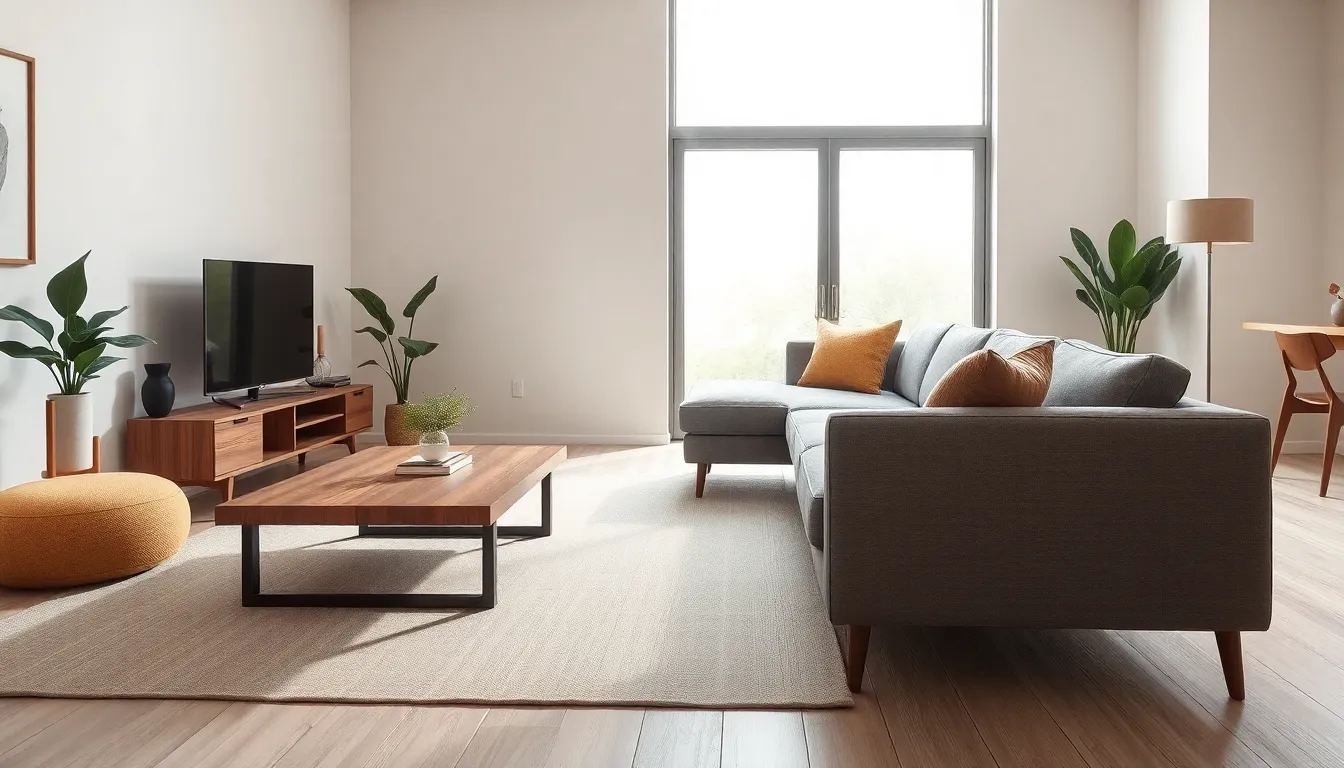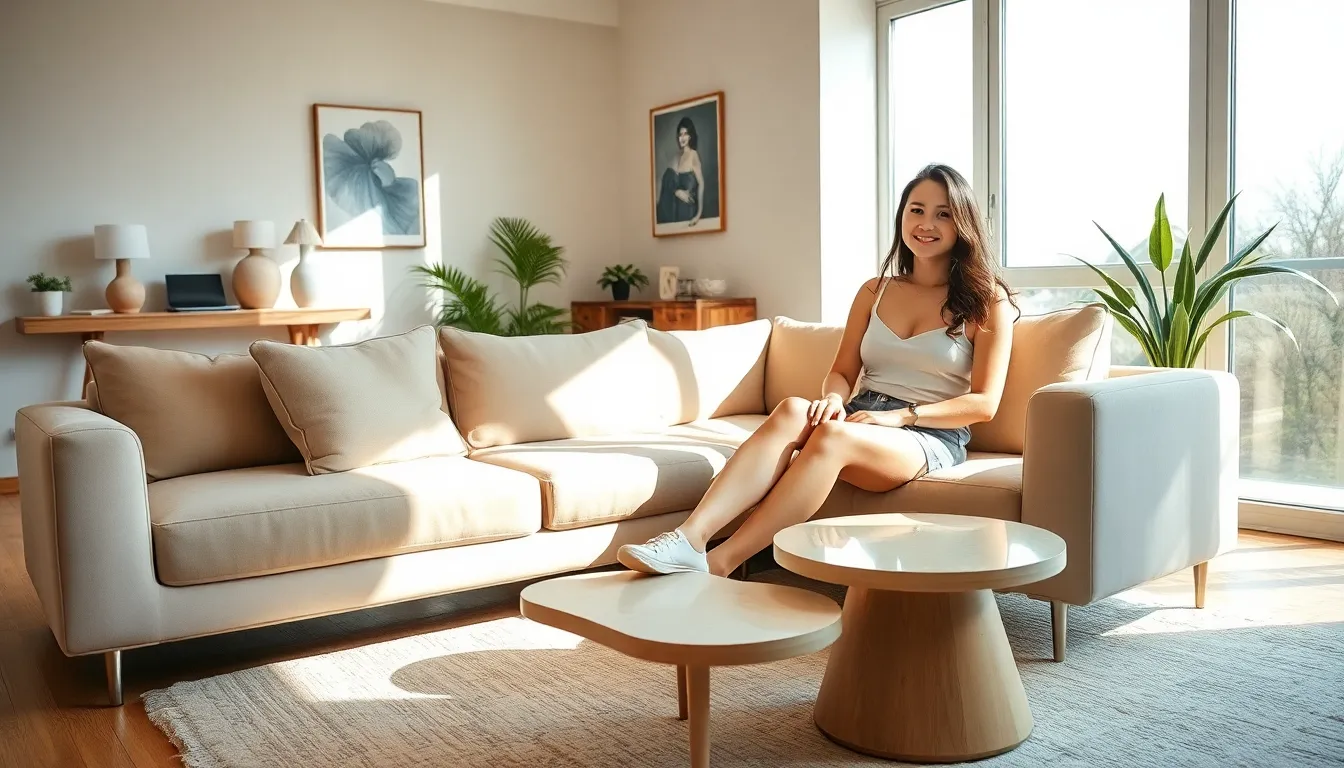In a world where avocado toast reigns supreme and minimalism is the new black, modern furniture has taken center stage in home design. Gone are the days of bulky, ornate pieces that scream “I have too much stuff!” Instead, sleek lines and functional designs invite a breath of fresh air into living spaces. Who knew that a simple sofa could spark joy and make a statement at the same time?
Table of Contents
ToggleOverview of Modern Furniture
Modern furniture emphasizes minimalism, merging form and function seamlessly. Sleek lines and simple shapes characterize this design trend, which prioritizes utility while maintaining style. Furniture pieces like modular sofas and streamlined tables reflect these values, enhancing both aesthetics and comfort in living spaces.
Materials play a critical role in modern design. Common choices include metal, glass, and sustainable woods, chosen for their durability and eco-friendliness. High-quality finishes add elegance without unnecessary embellishments, appealing to contemporary tastes. Color palettes often favor neutrals, allowing versatility in decor while creating a serene environment.
Functionality remains at the forefront, with many modern pieces offering adaptive features. For instance, coffee tables often incorporate storage solutions, while sofas may convert into beds. Such innovations cater to changing lifestyles and increasing urban living demands, making space optimization essential.
Style is also adaptive, branching into various sub-styles like industrial and mid-century modern. Each sub-style retains the core principles of minimalism while adding unique touches, attracting diverse preferences. Designers continually explore new ideas, enhancing modern furniture’s appeal while pushing creative boundaries.
Ultimately, modern furniture serves a dual purpose: it enhances interior spaces and enriches the lives of those who inhabit them. It fosters a sense of calm through simplicity, contributing to well-designed, welcoming environments. Choosing modern furniture means embracing a lifestyle that values functionality, aesthetics, and thoughtful living.
Key Characteristics of Modern Furniture

Modern furniture embodies the principles of simplicity and sophistication. It showcases distinct characteristics that define contemporary living spaces.
Minimalism
Minimalism stands as a foundation in modern furniture design. Clean lines often replace intricate details, emphasizing visual clarity. Each piece is purposefully constructed, offering aesthetic appeal without excess. Functionality takes precedence, ensuring that furniture serves practical needs while enhancing environments. Spaces feel more open and inviting with fewer but carefully chosen items. Contemporary homes thrive on this principle, creating areas where beauty meets functionality seamlessly.
Functionality
Functionality remains at the forefront of modern furniture. Designers prioritize adaptive elements that cater to everyday challenges. Versatile pieces simplify urban living, with items designed for multiple uses. For instance, coffee tables with hidden storage and sofas that convert into beds provide practical solutions. This thoughtful approach allows residents to maximize limited space effectively. Each item contributes to a lifestyle that values efficiency and ease, transforming homes into multifunctional havens.
Use of Materials
The use of materials plays a vital role in modern furniture’s appeal. Sustainable woods, metals, and glass dominate, highlighting durability and eco-friendliness. Each material choice reflects a commitment to quality and longevity. High-quality finishes elevate the style, adding an elegant touch without overt embellishments. Color palettes skew towards neutral shades, promoting serenity and versatility in design. By focusing on well-selected materials, modern furniture enhances interiors and supports a responsible lifestyle.
Popular Styles of Modern Furniture
Modern furniture features various styles that highlight distinct aesthetics and functionalities, enhancing contemporary living spaces. Each style brings unique elements that cater to diverse tastes and preferences.
Mid-Century Modern
Mid-Century Modern furniture showcases simplicity and organic forms, emerging primarily in the 1940s to 1960s. This style emphasizes functionality and minimalism with its clean lines and geometric shapes. Iconic pieces include the Eames Lounge Chair and the Noguchi Table, both recognized for their timeless appeal. Designers often use materials such as molded plywood and fiberglass, which enhance durability and comfort. Bright colors and natural wood grains contribute to the aesthetic, creating lively yet inviting spaces.
Scandinavian Design
Scandinavian Design emphasizes simplicity, minimalism, and functionality, rooted in the principles of “form follows function.” Clean lines and light color palettes characterize this style, creating a sense of openness. Iconic brands like IKEA popularized this design, showcasing affordable and stylish options. Natural materials, including birch and wool, dominate furnishings, promoting environmental sustainability. The approach also incorporates practical elements, such as storage solutions that cater to compact living spaces, reflecting a balanced lifestyle.
Industrial Style
Industrial Style draws inspiration from warehouses and factories, featuring raw elements that add character to spaces. Exposed brick, metal fixtures, and reclaimed wood create a rugged and authentic atmosphere. This style embodies an unfinished, utilitarian aesthetic, often incorporating vintage items alongside modern pieces. Furniture designs emphasize functionality, as seen in multifunctional tables and chairs. Color schemes typically consist of neutral tones, allowing the natural materials to shine in contemporary environments.
Benefits of Choosing Modern Furniture
Modern furniture offers several advantages that enhance both living spaces and the quality of life.
Aesthetic Appeal
Simplicity defines modern furniture, drawing attention with clean lines and minimal ornamentation. Colors often revolve around neutral tones, ensuring harmony within any décor. Each piece enhances visual clarity, creating an inviting atmosphere. Designers focus on form and function, allowing items like sleek sofas and geometric coffee tables to shine. Iconic designs, such as the Eames Lounge Chair, demonstrate elegance while remaining approachable. This aesthetic versatility caters to various tastes, allowing homeowners to express their style without overwhelming spaces.
Space Optimization
Modern furniture excels in maximizing limited spaces through innovative designs. Multi-functional pieces, such as storage ottomans and extendable dining tables, cater to urban living challenges. Flexible arrangements promote creativity in smaller rooms, enabling efficient layouts. Adaptable elements, like modular sofas, provide options for reconfiguration based on daily needs. Homeowners enjoy open and airy environments, as modern designs emphasize negative space. Intentionally chosen furnishings contribute to a balanced flow throughout interiors, making every area feel purposeful and comfortable.
Durability
Durability stands out among the benefits of modern furniture, built with high-quality materials that ensure longevity. Sustainable woods, metals, and glass are commonly employed, promoting eco-friendly choices. Unlike traditional items, contemporary pieces resist wear and tear, providing reliable functionality. High-quality finishes enhance appearances while protecting against damage. Manufacturers prioritize craftsmanship, resulting in products that endure daily use. Investing in modern furniture guarantees that style and resilience coexist, making it an ideal choice for discerning homeowners.
Modern furniture plays a pivotal role in shaping contemporary living environments. Its focus on minimalism and functionality not only enhances aesthetics but also improves the quality of life for those who embrace it. By prioritizing clean lines and versatile designs, modern furniture creates open spaces that foster creativity and comfort.
The thoughtful selection of materials and colors further contributes to a serene atmosphere, making each piece a valuable addition to any home. As individuals seek to simplify their lives, modern furniture stands out as a reflection of intentional living, blending style with practicality. This approach not only transforms spaces but also enriches everyday experiences, proving that good design is about more than just looks.




